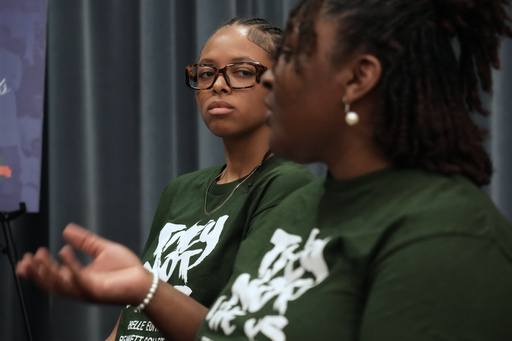GREENSBORO, N.C. — Spread across North Carolina’s coastal plains and rural areas are 10 historically Black colleges and universities (HBCUs) profoundly rooted in activist history, which could play a significant role in the state’s upcoming elections. Local student governments, alongside various organizations at these institutions, are energizing nearly 40,000 students to vote, especially as Vice President Kamala Harris, an HBCU alumna, pursues the presidency.
In preparation for Election Day, the North Carolina Black Alliance has collaborated with each HBCU, as well as one predominantly Black institution, to facilitate student transportation to the polls during the early voting period. The “Votecoming” tour, a nod to the cherished homecoming tradition, aims to educate students about the ballot and encourage them to vote early to sidestep potential issues with voter ID and registration, explained Gabrielle Martin, the alliance’s campus coordinator.
While the initiative is non-partisan, the presidential campaign of Harris, who graduated from Howard University, undoubtedly heightens enthusiasm among students. Justin Nixon, a senior and student government president at Johnson C. Smith University, emphasized that Harris’s candidacy showcases what HBCUs can achieve. He remarked, “It’s a testament to our capabilities, and we now have representation at the national level.”
Yet, students clarify their focus is on civic participation rather than political allegiance. “In a crucial election like this, it’s vital for us students to take charge of something so significant,” expressed Kylie Rice, a senior and student government leader at North Carolina Agricultural and Technical State University, the state’s largest HBCU. “We honor our predecessors and acknowledge the civic duty passed down to us,” she added, noting the importance of maintaining the momentum of civic engagement.
Historically, students from North Carolina’s HBCUs have driven civil rights activism for generations. For instance, in the late 1930s, students from Bennett College protested against a local cinema that censored Black individuals from films. Additionally, in 1960, Bennett Belles partnered with students from North Carolina A&T to demonstrate against discriminatory practices at a local eatery.
Lanell Jones-Huddleston, a junior at Bennett, expressed pride in continuing the legacy of activism: “We’re making history while honoring the efforts of our predecessors.” The commitment to activism continues to be relevant today. In recent years, North Carolina’s Black communities have faced difficulties, including gerrymandering that weakened their voting power, prompting students from North Carolina A&T to stand against such injustices.
The state is currently grappling with voter ID litigation and the aftermath of Hurricane Helene, which has raised concerns about the voting process. “Early voting is crucial so that if any issues arise with registration or identification, students have ample time to rectify them and ensure their votes count,” Martin stated.
The Votecoming tour commenced on October 17, coinciding with the start of early voting in North Carolina, at Shaw University and will conclude at Fayetteville University this coming Friday. Various engagement activities have also been organized, including voter information sessions at Bennett College, classes discussing voting’s significance at Elizabeth City State University, and community events featuring Black sororities and fraternities.
North Carolina’s status as a competitive battleground is highlighted by Donald Trump’s narrow victory in 2020, where he won by a mere 74,481 votes— the closest margin of any state he carried. “With such a slim margin, the collective voting power of HBCU students is significant,” Nixon noted, emphasizing their influence in shaping political discussions within the Black community.
Harris’s campaign is conducting an HBCU homecoming tour, which includes a stop at Shaw University, while the Trump campaign plans its own outreach to HBCU students, citing efforts such as establishing permanent funding for these institutions. “As Gen Z, this is our first opportunity to make our voices heard,” said Jazmin Rawls, a sophomore at Bennett who has already introduced Harris during her visit to Greensboro.
With such high stakes in this critical election, Shelby Fogan, a senior and Bennett’s student government president, decided to change her voter registration from Ohio to North Carolina, believing her vote would carry more weight in her new state. “I considered where my vote would be most effective, and for me, that’s North Carolina,” Fogan explained.
Students are keen to evaluate candidates’ commitments to support HBCU funding as these institutions have historically faced financial challenges. In 2019, Bennett College lost its accreditation due to financial difficulties, and while it regained this status in 2023, the need for funding remains pressing.
With lower tuition costs, HBCUs provide critical access to education for Black students, making the issue of funding imperative. “Our funding is crucial,” said Aleah Crawford, a junior at Elizabeth City State University. “Without it, many may find it impossible to afford college.”
Recognizing the vital role of their institution within the community, students at Elizabeth City State, the only local four-year college, stress the importance of advocacy. “We need to prioritize our student body because we significantly contribute to the financial landscape of this city,” stated Caszhmere Chaison, a junior and student government representative.
This call for advocacy resonates with HBCU students across the nation. Suzanne Walsh, student government president at Bennett, remarked, “Our responsibility is to ensure we are not overlooked.”
